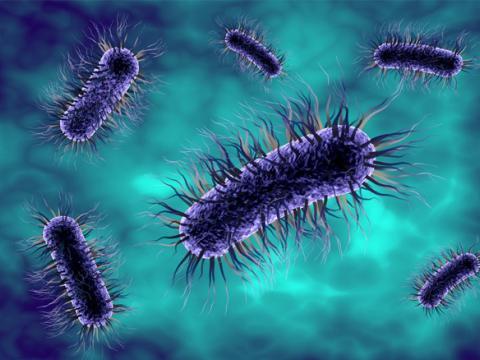What is immunity?
Immunity is the body’s capacity to defend itself against dangerous external attacks, such as infection from germs. Our bodies are constantly exposed to germs (such as viruses and bacteria) and foreign substances (such as pollen and allergens) living in our environment. The human body is conducive to the development of germs. It is natural they are tempted to take up residence. When this is the case, our body uses the immune system to put up defence mechanisms.
Immune response: our defence mechanism
To protect our body from disease-causing agents or germs, our immune system has two types of action: innate immunity and adaptive immunity. These actions are triggered when one or more antigens which are foreign to our body are identified.
Innate immunity
Our bodies have physical barriers to protect us against invasion. They are in the skin, the digestive mucous membrabe (a protective layer whose surface area is about 300 m2), the lungs and the urogenital system. If this is insufficient, an immediate response is triggered. That is our immune system’s first reaction to an invasion. It detects the attacking micro-organisms and eliminates them.
Adaptive immunity
If the innate immunity is not capable of stopping the invasion of micro-organisms, a second immune response is triggered about 96 hours after contact with the foreign body. This reaction is specific to each micro-organism. Our immune system recognises the antigens and attacks them directly in a systemic way. This action is not limited to the contact area, but is applied throughout the body. The particular feature of the adaptive response is that it remembers attacks. As a result, every time a pathogen returns, the body reacts more powerfully and more quickly.
What are the signs of weakening immune defences?
Certain signs indicate weakening immune defences:
- persistent fatigue due to either chronic stress and/or bad sleep for example;
- slow healing or an increased risk of infection: the immune system has a role in healing and recovery which are slower when the immune system is weakened;
- recurring infections such as colds or cystitis which indicate that the body is incapable of defending itself against pathogens.
Weakened immunity: the factors
A range of factors can undermine the immune system:
Age
An infant’s immune response is weaker because the immune system is not fully mature. At birth, however, infants have antibodies provided by their mother to compensate for this deficiency. This protection continues during the first months of a baby’s life if they are breast fed because they continue to benefit from their mother’s antibodies.
As we age, innate and adaptive immune responses become gradually less effective1. Elderly people suffer from frequent and prolonged infections.
Healthy lifestyle
An unhealthy lifestyle has negative effects on our immunity: smoking reduces your immunity3 and insufficient sleep makes the body vulnerable to infections4.
Chronic stress impairs immunity significantly: it is immunosuppressive and deregulates immune responses2.
Intense physical activity can impair immunity1 while moderate exercise has a positive effect5.
Natural products which boost our defences: vitamin C and zinc
The important role of nutrition - particularly vitamins and minerals - in the optimal operation of our immune system has been widely documented. It is recognised that a varied and balanced diet is a key ingredient for a strong immune system6. Vitamin C and zinc are particularly useful. They contribute to our defences by protecting the body from oxidative stress which is generated to eliminate foreign substances. It is therefore important to give priority to food rich in these elements. These include seasonal fruit and vegetables for Vitamin C, and oysters, wheatgerm and crab for zinc. Several studies have demonstrated the positive effect of a vitamin C and zinc supplementation, for treating colds for example.
Other valuable micronutrients
Vitamin D
Vitamin D also contributes to our immune responses. A deficit in vitamin D is more frequent in winter because it is partially synthesised by the rays of the sun on the skin. Some examples of sources of vitamin D are: fermented milk, sardines, almonds and hazelnuts.
Iron
Iron plays an important role in our immune response. Some examples of sources of iron are: blood pudding, beef, lentils, white beans and chick peas.
Antioxidants
Reducing oxidative stress on our cells also boosts the immune system. Seasonal fruit and vegetables are important sources of antioxidants.
Probiotics: an impenetrable safeguard
Recent studies have shown the negative impact of insufficiently diverse intestinal microbiota on the immune system which causes certain autoimmune diseases7. Probiotics are friendly bacteria which help to restore and rebalance intestinal microbiota. They prevent undesirable germs from multiplying. Administered orally in sufficient quantities, they have a positive effect on the defence mechanisms provided by our mucous membranes and immune system.
Probiotics can be found in fermented milk products such as yoghurt, cheese and cottage cheese, and can also be taken as dietary supplements.
Why boost your immunities?
It is important to maintain strong immunity all year round, but there are two periods in the year when exposure is particularly high. Autumn and winter are high-risk periods for the growth of germs which cause colds, flu and other infections. Spring, on the other hand, is when allergies reoccur. However, it is possible to prepare for these high-risk periods.
A health professional can recommend a diet tailored to your situation, needs, personal history, habits and micronutrient status. They can also suggest a supplement of probiotics to restore the properties in your intestinal microbiota which may have been modified by antibiotics for example.






